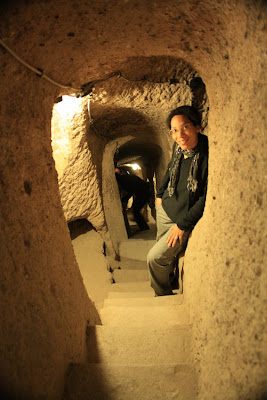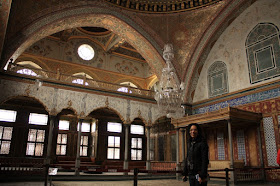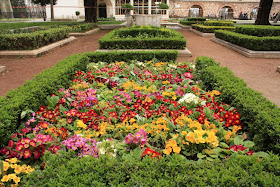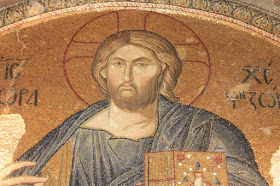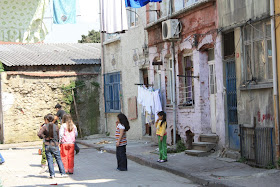GLOBALIZATION
Nowadays Globalization makes that any event all over the world could affect even our small company in our small town. Today there are too many uncontrollable variables which generates uncertainty and, therefore, risk in our decisions.
This changeable environment forces us to have discretion and common sense. Also we must always be well informed, we must read a lot from reliable sources and always with critical thinking. And we must have a model which let us link all this variables and we must learn to reason in order to organize all the information we get.
CRISIS CAUSES
This Globalization isn't the only reason of this crisis because it doesn't eliminate the individual freedom. However, Globalization has amplified and expanded the effects of this crisis of communication, honesty, ambition and values.
It's a communication and honesty crisis since nobody has spoken clearly and financial products have been sold which not even the sellers knew what they really were or this sellers didn't want to explain the buyers what they really were.
And it's a values crisis because many people, especially banking, have tried to earn money at any price (for examble, offering subprime mortgages to pleople who couldn't afford) without taking into account the consequences of very few clear transactions, or very risky transactions like the ones with hedge funds.
CRISIS OVERCOMING
The solution to the crisis demands politicians more honest which try to improve the social and economic wellfare instead of only thinking of reaching the power at any price. This solution demands especially much common sense and to recover the ethics and the coherence in business, economical and financial activity. It also strongly demands wisdom and prudence in our decisions and ability in the priorization of the difficulties. It demands huge doses of optimism and global citizens who risk hunting business oportunities out of their city or country.
CONCLUSION
It will be essential to recover the proactive attitude, to work hard again, the enterprising spirit and the individual initiative. The world needs more businessmen who generate economical value and wealth. And the world needs especially businessmen of their own lifes, generating value improving their surrounding people and smiling at many people, at all the people we can.
Summarizing, this book explains the origin of the current crisis and the reasons of its universality. It's also a book of basic economics clearly explained. But it's especially a social book which stress the social consequences of economics, of its crisis and of the lack of ethics. Everything under a really humanistic and close point of view. The autor searches for the complicity and empathize with the reader impregnating all the pages with sense of humor, anecdotes and personal experiences. A pleasant and enjoyable book very easy to read.
CRISIS CHRONOLOGY
1 - 2001. Internet explosion and .com companies bubble.
2- The US Federal Reserve reduces in only two years the rate interest from 6.5% to 1%.
3- This dopes the housing market, which at that moment was taking off.
4- The real price of housing in USA doubles in ten years.
5- The interest rate in the international financial markets has been unusually low for years.
6- Banks realized that business became smaller.
7- Us Banks began to:
a) give riskier credits with a higher interest rate.
b) Compensate the lost of profit margin increasing the number ot transactions.
8- Concerning the riskier credits, they offered mortgages to Ninjas (no income no job no assets) with a higher interest (there was more risk) and they tried to take advantage of the housing boom: although ninjas couldn't pay, the house would be more valuable. This mortgages were called subprime. As US economy goes well, the current insolvent debtor could find a job and pay.
9- Concerning the number of transactions, as banks gave many loans, they run out of money and they asked foreign banks for money, so the risk expanded.
10- To fulfill Basilea rules (a minimum capital relative to the assets), banks had to sell this mortgages to reduce their liabilities. To be able to sell the prime and also the subprime mortgages, they conceived the mortgage backed securities. Selling this products the got more money to keep giving mortgages and they kept expanding products of doubtful profitability all over the world.
11- Rating agencies helped banks with generous ratings of this kind of products of doubtful profitability.
Now It's worth remembering that this business was based on that Ninjas kept paying their mortgages and that the housing market kept increasing.
12- But in the early 2007 housing prices in USA slumped and Ninjas realized that they were paying for their house too much money, so they decided not to keep paying or they couldn't keep paying. Automatically nobody wanted to buy the mortgage backed securities and the ones who had them couldn't sell them. As the value of houses was less than the guarantees of the loan, the money began to disappear.
13 - Lehman brothers went bankrupt. It wasn't lucky because the US government didn't rescue it. It was too much after having done the same with AIG. US government wanted to teach banking a lesson, but the consequence was the worse crisis after the Second World War.
14- Banks didn't lend money each other because they didn't say how many waste productes the other bank has and, therefore, if they will be able to pay back the borrowed money. The euribor goes up as a consequence of the lack of confidence between banks. As banks didn't have money, they didn't loan money and they didn't give mortgages.
The euribor is the interest reference for mortgages in Europe. As the Euribor increases, people have more and more difficulties to pay the mortgages. So they reduce expenses and consumption falls. Companies didn't sell and, therefore, they reduce their production and dismiss workers. Unemployment increases. Unemployed people can't pay their mortgages. Delinquency ratio increases. The solvency of banks get worse and the loan descreases even more.15- While this crisis impoverished citizens, banking executives earned huge quantities of money thanks to bonus for the sale of financial products and mortgages of doubtful reputation.16 - The European Central Bank and the Federal Reserve have injected liquidity so that banks could have money and could keep giving loans.
17 - There are experts who say that, of course, there is money but there isn't confidence. That is to say, the liquidity crisis is in essence a confidence crisis.18 - Meanwhile sovereign funds (funds created by countries with superavit thanks to oil and gas exports) buy shares of big american bankrupt banks.19 - The Lack of loans suffocates companies, which have to dismiss workers, unemployment increases and consumption and housing investment decreases.
20 - Countries reduce their taxes collection because of a less economic activity and consumption and their social expenses increases due to unemployment compensations. Besides, countries have tried to give an incentive to consumption and employment with public investment. This high fiscal deficit generates a sovereign debt crisis wich causes an increase of the cost of the financing of this debt. The rescue of Greece encouraged investors and speculators who try to earn money generating doubts about the solvency of some countries and, this way, achieving an increase of the interest rate of their debt.
21 - To avoid speculation, countries have to reduce their fiscal deficits decreasing the social welfare state (many social policies disappear) and increasing taxes. This way the economy doesn't improve and people become poorer while banking executives keep earning a lot of money.
Finally, next you have links of other interesting book I have read:
Nowadays Globalization makes that any event all over the world could affect even our small company in our small town. Today there are too many uncontrollable variables which generates uncertainty and, therefore, risk in our decisions.
This changeable environment forces us to have discretion and common sense. Also we must always be well informed, we must read a lot from reliable sources and always with critical thinking. And we must have a model which let us link all this variables and we must learn to reason in order to organize all the information we get.
CRISIS CAUSES
This Globalization isn't the only reason of this crisis because it doesn't eliminate the individual freedom. However, Globalization has amplified and expanded the effects of this crisis of communication, honesty, ambition and values.
It's a communication and honesty crisis since nobody has spoken clearly and financial products have been sold which not even the sellers knew what they really were or this sellers didn't want to explain the buyers what they really were.
And it's a values crisis because many people, especially banking, have tried to earn money at any price (for examble, offering subprime mortgages to pleople who couldn't afford) without taking into account the consequences of very few clear transactions, or very risky transactions like the ones with hedge funds.
CRISIS OVERCOMING
The solution to the crisis demands politicians more honest which try to improve the social and economic wellfare instead of only thinking of reaching the power at any price. This solution demands especially much common sense and to recover the ethics and the coherence in business, economical and financial activity. It also strongly demands wisdom and prudence in our decisions and ability in the priorization of the difficulties. It demands huge doses of optimism and global citizens who risk hunting business oportunities out of their city or country.
CONCLUSION
It will be essential to recover the proactive attitude, to work hard again, the enterprising spirit and the individual initiative. The world needs more businessmen who generate economical value and wealth. And the world needs especially businessmen of their own lifes, generating value improving their surrounding people and smiling at many people, at all the people we can.
Summarizing, this book explains the origin of the current crisis and the reasons of its universality. It's also a book of basic economics clearly explained. But it's especially a social book which stress the social consequences of economics, of its crisis and of the lack of ethics. Everything under a really humanistic and close point of view. The autor searches for the complicity and empathize with the reader impregnating all the pages with sense of humor, anecdotes and personal experiences. A pleasant and enjoyable book very easy to read.
CRISIS CHRONOLOGY
1 - 2001. Internet explosion and .com companies bubble.
2- The US Federal Reserve reduces in only two years the rate interest from 6.5% to 1%.
3- This dopes the housing market, which at that moment was taking off.
4- The real price of housing in USA doubles in ten years.
5- The interest rate in the international financial markets has been unusually low for years.
6- Banks realized that business became smaller.
7- Us Banks began to:
a) give riskier credits with a higher interest rate.
b) Compensate the lost of profit margin increasing the number ot transactions.
8- Concerning the riskier credits, they offered mortgages to Ninjas (no income no job no assets) with a higher interest (there was more risk) and they tried to take advantage of the housing boom: although ninjas couldn't pay, the house would be more valuable. This mortgages were called subprime. As US economy goes well, the current insolvent debtor could find a job and pay.
9- Concerning the number of transactions, as banks gave many loans, they run out of money and they asked foreign banks for money, so the risk expanded.
10- To fulfill Basilea rules (a minimum capital relative to the assets), banks had to sell this mortgages to reduce their liabilities. To be able to sell the prime and also the subprime mortgages, they conceived the mortgage backed securities. Selling this products the got more money to keep giving mortgages and they kept expanding products of doubtful profitability all over the world.
11- Rating agencies helped banks with generous ratings of this kind of products of doubtful profitability.
Now It's worth remembering that this business was based on that Ninjas kept paying their mortgages and that the housing market kept increasing.
12- But in the early 2007 housing prices in USA slumped and Ninjas realized that they were paying for their house too much money, so they decided not to keep paying or they couldn't keep paying. Automatically nobody wanted to buy the mortgage backed securities and the ones who had them couldn't sell them. As the value of houses was less than the guarantees of the loan, the money began to disappear.
13 - Lehman brothers went bankrupt. It wasn't lucky because the US government didn't rescue it. It was too much after having done the same with AIG. US government wanted to teach banking a lesson, but the consequence was the worse crisis after the Second World War.
14- Banks didn't lend money each other because they didn't say how many waste productes the other bank has and, therefore, if they will be able to pay back the borrowed money. The euribor goes up as a consequence of the lack of confidence between banks. As banks didn't have money, they didn't loan money and they didn't give mortgages.
The euribor is the interest reference for mortgages in Europe. As the Euribor increases, people have more and more difficulties to pay the mortgages. So they reduce expenses and consumption falls. Companies didn't sell and, therefore, they reduce their production and dismiss workers. Unemployment increases. Unemployed people can't pay their mortgages. Delinquency ratio increases. The solvency of banks get worse and the loan descreases even more.15- While this crisis impoverished citizens, banking executives earned huge quantities of money thanks to bonus for the sale of financial products and mortgages of doubtful reputation.16 - The European Central Bank and the Federal Reserve have injected liquidity so that banks could have money and could keep giving loans.
17 - There are experts who say that, of course, there is money but there isn't confidence. That is to say, the liquidity crisis is in essence a confidence crisis.18 - Meanwhile sovereign funds (funds created by countries with superavit thanks to oil and gas exports) buy shares of big american bankrupt banks.19 - The Lack of loans suffocates companies, which have to dismiss workers, unemployment increases and consumption and housing investment decreases.
20 - Countries reduce their taxes collection because of a less economic activity and consumption and their social expenses increases due to unemployment compensations. Besides, countries have tried to give an incentive to consumption and employment with public investment. This high fiscal deficit generates a sovereign debt crisis wich causes an increase of the cost of the financing of this debt. The rescue of Greece encouraged investors and speculators who try to earn money generating doubts about the solvency of some countries and, this way, achieving an increase of the interest rate of their debt.
21 - To avoid speculation, countries have to reduce their fiscal deficits decreasing the social welfare state (many social policies disappear) and increasing taxes. This way the economy doesn't improve and people become poorer while banking executives keep earning a lot of money.
Finally, next you have links of other interesting book I have read:
- The Hunger Games (Suzanne Collins)
- Playing the Enemy (John Carlin)
- The Alchemist (Pablo Coelho)
- The Physician (Noah Gordon)
- The Lord of the Rings (J.R.R. Tolkien)
- The Hobbit (J.R.R. Tolkien)
- The Cathedral of the Sea (Ildefonso Falcones)
- The Art of Loving (Erich Fromm)
- Annoyomics (Risto Mejide)
- The Shadow of the Wind (Carlos Ruiz Zafón)
- The Afghan (Frederick Forsyth)
- The Eight (Katherine Neville)
- The Fire (Katherine Neville)
- The Da Vinci Code (Dan Brown)
- Angels and Demons (Dan Brown)
- Dante's Equation (Jane Jensen)
- Wecome to the Real World (Sandro Rosell)
- The Physician (Noah Gordon)
- The Pillars of the Earth (Ken Follett)
- Le Petit Prince (Antoine de Saint-Exupéry)
- El Quijote (Miguel de Cervantes)
- Victus (Albert Sánchez Piñol)

























